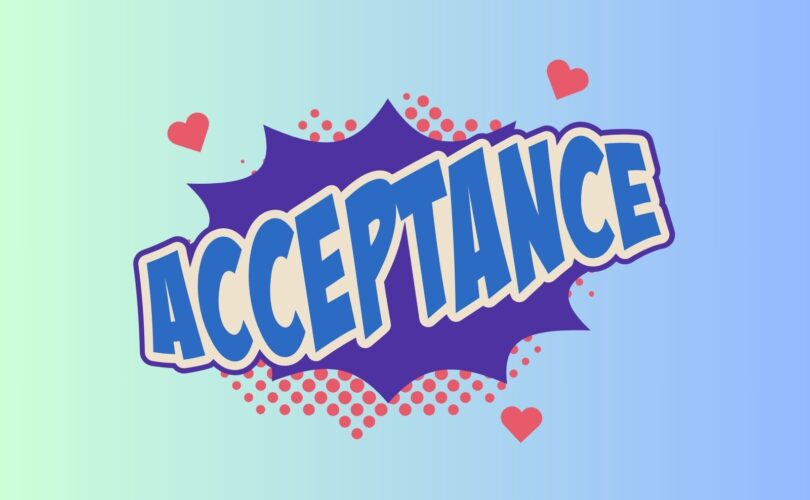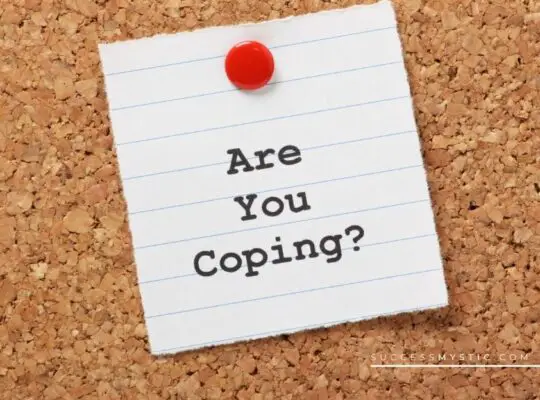The Magic of Acceptance
Acceptance comes in many shapes and sizes, from learning to accept yourself for who you are, to learning to accept the circumstances life brings you, and to genuinely learning to accept others as they are. There are so many things in this life we cannot control or change, and yet, we spend a lot of time thinking, worrying, and having negative emotions about so many of them. To live a life of peace, you must embrace acceptance as an essential life skill.
Change is inevitable. When you cultivate a stance of acceptance of change, rather than one of resistance and negativity, you can bring happiness and peace into your life. While it is not always easy to embrace change, particularly when it comes with other negative consequences for your life, it is an essential life skill to know when to accept things so that you can move on.
You cannot control life’s circumstances or other people. You can only control your reaction to them. When you choose to resist, you are creating an inner turmoil that clouds everything you do. This turmoil prevents happiness and growth. By learning to practice acceptance, you can better handle all of life’s challenges. The first step is learning to accept yourself.
Acceptance Brings Peace of Mind
There is a vicious cycle that many of us get stuck in, is preventing any real sense of inner peace from emerging. The sequence starts with dissatisfaction with your current circumstances, feelings, or thoughts. You then begin to focus on the notion of change. You think, “If this changes, I will be happy. If that happens, I will have peace.” It often isn’t even about the this or that. It’s about wanting something different. Wanting to be different.
So, we set about fixing ourselves. We think of all the ways we are broken, irreparable, incapable of being happy. We get stuck in a perpetual cycle of thinking, “This is not good enough,” or “If only this were different.” We are always judging ourselves and our current state, never enjoying happiness the present.
And even if you do find a way to fix whatever you believe the problem is, guess what lies right behind that moment? Another obstacle to your happiness. You are not at peace with yourself. You can therefore not be at peace with anyone else or the world in which you find yourself.
The path to inner peace begins with you. It starts with recognizing where you are, who you are, and choosing to be content. The way to inner peace comes not from self-improvement but from self-acceptance.
What You Resist Persists
Swiss psychologist Carl Jung’s famous words lend a lot to this discussion of acceptance and inner peace. Jung calls this phenomenon, the cycle of doubt and repair, The Shadow. When you resist certain aspects of your personality, those traits not only persist, they enlarge. The full quotation is actually, “What you resist not only persists, but will grow in size.”
Constant resistance to aspects of your inner self produces tension and a sense of being unfulfilled. Rather than focuses on small parts of yourself, focus instead on the whole and accept yourself fully. Otherwise, The Shadow will rule your life.
It is not the actual feeling of sadness or jealousy or anger that steals your inner peace. It is the voice inside your head telling you that those emotions are invalid, they are bad or wrong. Having these emotions is not the same as your judgment about these emotions, and it is the latter that is robbing you of your chance for inner peace.
So, how do we retrain our brains to stop the judgment and accept the emotions, the traits of our personality that we’ve been trying to fix for so long?
There are some techniques, strategies, and thought patterns you can utilize that will help enhance your sense of acceptance. They can retrain your brain to silence that voice of resistance and learn to be okay with the way things are.
Acceptance of Yourself
Acceptance must start from within. To be at peace and practice acceptance as an essential life skill, you must accept yourself without judgment. When you are always judging yourself, never happy with who you are, you create more unhappiness and dissatisfaction, not less.
Acceptance of yourself is not about letting go of your dreams and wanting to move forward. It’s just the opposite, actually. Acceptance of yourself happens in the present moment, right now. You examine yourself without judgment to determine how you are feeling, without deciding if that is “good” or “bad.” When you continually resist aspects of your inner self, you create tension and dissatisfaction with life.
Accepting yourself fully allows you to relieve the tension and move forward toward satisfaction. You must silence the part of your mind that is judging how you feel. That voice is not bringing acceptance; it is creating the turmoil. Accepting yourself allows you to find peace and be happy with who you are.
Making a choice every day to accept yourself can be hard, especially if you have been struggling with your unhappiness for years. But, if you are really interested in developing acceptance, the best place to start is with yourself. Here are a few strategies that can be helpful when trying to establish personal acceptance.
Listen to the Voice, Then Silence It
Be mindful of the negative thoughts and stop them as soon as they start. Focus on your internal monologue, listen to how you are talking to yourself. When you hear the negativity begin, when you listen to yourself judging your feelings, actions, and thoughts, stop it immediately. Change your thoughts to focus on the positives aspects of you and your life.
Focus on what you have learned, how you have helped others, what you have seen or heard that gives you hope. Change the trajectory of those negative thoughts as soon as they start. With practice, you can master this and start silencing your private judgment.
Remember It’s Not Always About You
There is so much that happens in life that has absolutely nothing to do with us, and yet we find ourselves engaging in negative self-talk about it. Take yourself out of the situation and consider, how much of what happened, how much of how others act and react, has anything to do with you. Chances are, it’s very little.
Things happen. People are who they are. It’s not about you or anything you did or didn’t do. When you take yourself out of the equation, you can accept that not everything is good or bad. It just is. Try consciously doing this for several days or weeks. Break the pattern of negative thoughts your brain has developed and just observe and notice instead.
Working on accepting yourself takes times, and there are many other strategies you can use to help you. Remember that you are in charge of those inner voices, and silencing the negative ones is the first step toward peace.
Acceptance of Others
Accepting others means you believe everyone is unique and there is no right or wrong when it comes to how people choose to be different. Everyone has the right to his or her own opinions, feelings, and thoughts, just as you do. When you realize that people are who they are, and you cannot change that, you can accept them.
We each recognize that everyone is different from ourselves, but when you place a judgment about that uniqueness, you are not accepting those differences. When people act or believe differently than you, it can be difficult to accept them without judgment, but once you are able, you will find peace and happiness you have never known.
There are a few strategies you can practice that will help you develop empathy and acceptance for others.
Give Up Trying to Control Others’ Feelings
You cannot tell someone how to feel. Period. While it may be frustrating that they cannot understand your view or aren’t benefiting from your experience, everyone has the right to their own emotions and perspectives. Accepting that others’ have feelings that are different than yours is essential to practicing empathy and developing acceptance toward others as an essential life skill.
Different Is Okay
If everyone in the world were identical, it would be a rather dull place, don’t you think? The fact that we each have our own characteristics and qualities that makes us unique is a good thing. It makes the world interesting. While these differences can sometimes make us uncomfortable, they are just differences.
You have choices about your reaction to them, though. When you accept others and develop empathy, you value these differences. Getting to know someone very different from you can help you learn new things, see new perspectives, and perhaps understand you are not as different from one another as you assumed.
It can be effortless to judge others, and you may even do this without realizing that is what you are doing. You don’t know why others make the choices they make, you are not living their life and dealing with the consequences. Focus instead on their good qualities, what you admire about them. Focus on the positives and remind yourself they are doing their very best, just as you are.
Remember that comparison is just another form of judgment. Since we are each unique, trying to compare any two is unfair. You can never be happy if you are always comparing yourself to others or others to you. If you accept each person for who they are, you can value their differences and be at peace with what does not match with your own life.
When you are struggling to accept someone for who they are, remember that their lives are very different than yours, and they are making the best choices they know how.
Practicing acceptance of others can help you be accepting of yourself and the circumstances in life that aren’t always what you want. Being accepting helps you to be a happy, more positive individual.
Acceptance Of Life’s Circumstance
When you can accept, you can live happily knowing you cannot control or change everything. When you accept, you recognize that life isn’t fair, and you will not always get what you want. Acceptance is not the same as denial or complacency, but it is a helpful way to look at life and remain positive.
When things go wrong or life hands you challenges you don’t like, it’s easy to choose to deny or resist, even to wallow in your unhappiness, rather than accept what is happening. For every event in your life, though, you have two choices.
You can let the event define you, or you can define the event’s place in your life. You have control over your reaction to the bad things in life, even when you don’t have control over the events themselves.
The moment you decide to accept that this has happened, whatever “this” is, is the moment you can choose how you are going to move forward. By letting the resistance and negative thoughts take over, you are choosing to live unhappily, choosing to stay upset.
Talk with loved ones, get advice from others, get counseling if you feel you need more professional help to process what you’ve experienced. Get the help you need to accept what has happened, then choose to move forward with peace.
Avoidance and escapism will only prolong your suffering and sadness. Choosing acceptance is the path to happier living and peace within yourself.
How To Develop Acceptance In Your Life
There are many ways you can retrain your mind to break the cycle of negativity that keeps you from acceptance and inner peace. Here are some suggestions that have been helpful for others. If you try one for a while and are not successful, choose another.
Remember that your old patterns of thinking are just that, patterns. They are habits you learned over time, which means it will take time to unlearn them and develop new, healthier ways of thinking. Don’t give up but keep moving forward.
Make The Choice Every Day To Let It Go
Whether you are trying to accept a difficult loss, a complete and unwanted change in your lifestyle, or a minor annoyance that ruins your day, you always have two choices. You can resist the change and remain unhappy. Or, you can let it go and move on.
You cannot change things that have already happened. There is no “undo” button for life’s choices and events. If you choose to resist and stay mired in how it’s making you feel, you will stay there. And you will be unhappy.
If, however, you make a choice to accept life, accept yourself in your present state, accept the consequences of whatever has come before, then you can move on. By choosing acceptance, and remembering that it is a choice, you can make progress toward inner peace.
Start small. Shrug off the lunch date that stood you up. Laugh about your spilled coffee mishap. Take the little things in stride, and you’ll soon realize it’s easier to accept the bigger ones, as well.
Silence The Obsessive Thoughts
Many of us have a constant, inner monologue running 24/7, rattling off all the things that need to change, all the things we need to do, all the ways we need to improve. Whether it’s lying in bed at night, while we are in the shower, or during our drive to work, that voice is always there. Needling. Picking. Commenting.
As soon as you hear the voice, silence it. Stop the negativity before it can snowball into non-stop blather. Once you are aware of the obsessive thoughts, see if you notice a pattern. What triggers their occurrence?
When you start to notice the stressors that generally trigger them, choose something else to think about. Choose to consider all the things you are grateful for, all the ways you have helped others today, all the little positive moments you have experienced lately.
It will take time to turn obsessively negative thinking into powerfully positive thoughts, but again, with practice, you can make this shift. When you change your thoughts, you can change your actions. When you start to consider the positive over the negative, you are accepting, and you are at peace.
Try just saying, “It is what it is.”
This mantra is a good way to take yourself out of the situation. It’s not about you. It is what it is. It has nothing to do with how good or bad you are. It is what it is. It doesn’t matter if you wanted something different. It is what it is.
Attaching this mantra to every situation in your life for several days or even weeks helps you break the cycle in which your brain is stuck and enables you to see that your resistance to life and its never-ending changes is what is making you unhappy.
When you decide to accept the moment, whatever it may bring to you and your life, you are at peace. You are no longer labeling things as good or bad, right or wrong. They just are. They just happen.
Experiment with this mantra. See how it works for you. Try it and others out to see what works for you in breaking your cycle of resistance. Once you are more aware of how often you judge and resist life’s occurrences, you can begin to move forward with the understanding of inner peace.
Focus on the beautiful
Spend time each day noticing the ordinary and extraordinary to appreciate all the beauty life has to offer. When you focus on what is missing, you forget to recognize what is there. The earth and its bounty have much to offer in the way of beauty, as do all the people who share it with us. Take time to look around, to look up, to look within. Notice. Observe. Appreciate.
Start small and take a moment at the end of each day to write down one beautiful thing you remember from your day. Is it the sweet taste of fresh berries, the sunlight streaming through the trees, a child’s laughter that turns into a squeal of delight?
These are things you can learn to live for and focusing on the beautiful leaves less room in your mind for the negative thoughts.
Every experience you have is new, even if it’s the same thing you do every day. You are different; the world is different. What you take away as beautiful or meaningful is up to you. Think of the way a child sees the world. For them, everything is new and exciting. Try to look through those eyes, imagining the wonder in each moment.
Learn to say yes
One of the habits we get into when we wall ourselves off from the pain of life is always saying, “no.” No means we don’t have to experience disappointment. No means we won’t do anything to embarrass ourselves. No means others can’t reject us because we reject them first.
When we practice saying yes, we open ourselves up without resistance. Set the parameters that make you feel comfortable (i.e.- Do I feel safe? Do I have the financial resources to do this?) Once you have your boundaries, just say yes. When experiences and opportunities come your way, say yes.
What saying yes does is free you. You are free from making the decision, which is fraught with self-doubt and angst. The choice is already made for you. You are free to experience it, learn from it, and move on. It also frees you to fail without consequences.
Things didn’t go so well? That’s okay.
You said yes and did your best; now you can move on. Saying yes can lead you to new, positive habits and people, and help you find the wonder and acceptance you need for inner peace.
Check in every day
When you start to feel that familiar tug back into doubt and fear, it’s because you haven’t connected with yourself in too long. Take time every day to contemplate how you are doing on your journey toward acceptance. This is not a time for judgment but merely a temperature check.
It brings you back to the present and out of the dreaded regret of the past or anxiety of the future. It refocuses you and resets your thoughts. Whether you enjoy meditation or writing in a journal or thinking aloud over a cup of coffee, check in. Notice. Be aware.
Focus on solutions
Complaining accomplishes nothing. Most people think it will make them feel better when, in reality, it makes you feel worse. Take the energy you usually put into complaints and redirect it toward solutions.
Whether you spend five minutes, five days, or five years grumbling about something, it will still be a problem at the end of your complaining. Ask yourself what you can do to solve the problem or move on from the emotion, then act. If there is no solution, then remember your earlier mantra. It is what it is. It’s time to accept and move on.
Acceptance As a Life Skill
The ability to practice acceptance in your life, for yourself, for others, and for the unfortunate circumstances of life, gives you power over your mind.
You can find peace because you know where you stand in the world. Your power of acceptance can provide you with more happiness than anyone or anything else, so start developing this essential life skill to live a happier, more peaceful existence.
Choosing Acceptance Toward Inner Peace
Reframing your thoughts can be a complicated process, especially if you have been in the cycle of negativity and doubt for years. With practice and patience, though, you can learn new, healthier habits of mind that will help you accept yourself, others, and life’s circumstances, bringing you inner peace and tranquility that can only be achieved when you let go.







